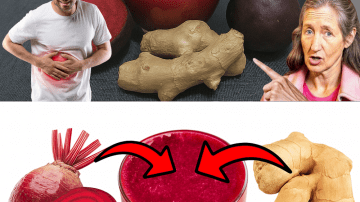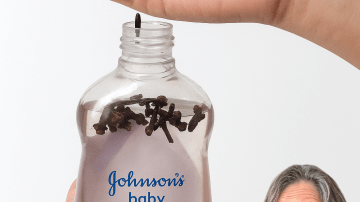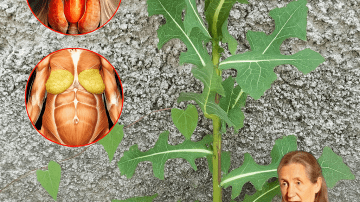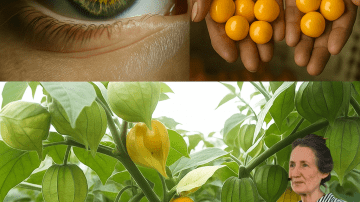It thrives in neglected corners, along roadsides, and even pops up unexpectedly in manicured gardens. Its large, luminous trumpet-shaped flowers bloom under the moonlight, exuding a heavy, seductive fragrance. You may have walked right past it dozens of times, unaware that this striking botanical specimen, known commonly as Thorn Apple or Jimsonweed, holds one of nature’s most potent—and terrifying—secrets.
We are talking about Datura stramonium, a plant whose history is interwoven with shamanic rituals, ancient medicine, and dark folklore. It’s a plant of profound contrasts: beautiful yet deadly, revered yet feared. While its use in history is fascinating, its modern presence poses a catastrophic risk. Every part of the Datura plant—from its roots to its spiky seed pods—contains a cocktail of highly toxic compounds that can swiftly lead to terrifying delirium, coma, or even death.
This isn’t a cautionary tale about a rare tropical species; this is about a pervasive, ubiquitous plant that demands immediate respect and caution. If you value the safety of your family, your pets, and your own well-being, you need to understand the dark power hidden beneath the Thorn Apple’s stunning facade. Prepare to delve into the enigmatic world of Datura and discover why this common weed is a real-life botanical threat that must be recognized and avoided.
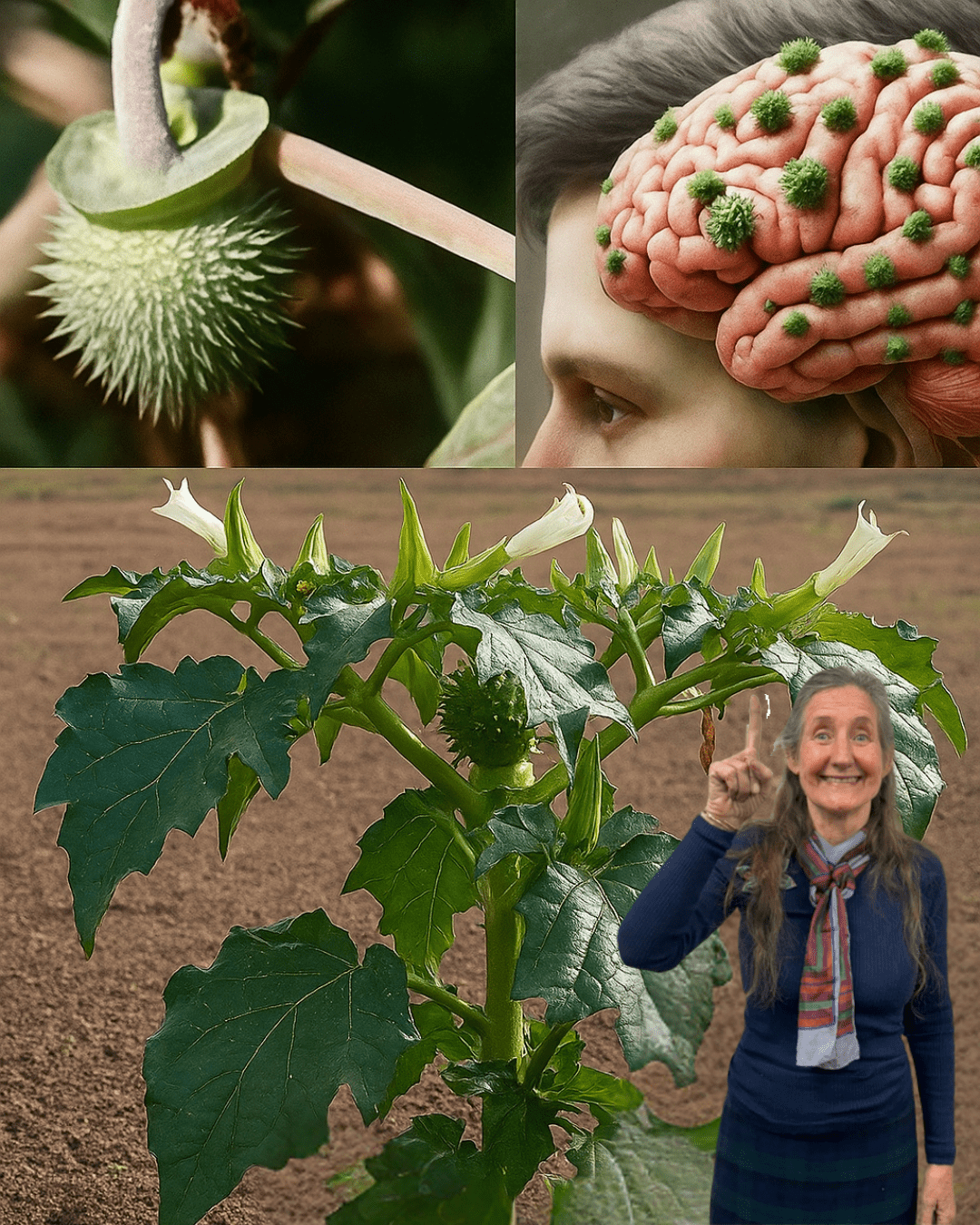
**🌿 Unveiling the Enigma: Botanical Characteristics of Datura Stramonium
Datura stramonium is a hardy annual belonging to the notorious nightshade family (Solanaceae), which includes belladonna (deadly nightshade), but also common vegetables like tomatoes and potatoes—a lineage that proves just how dangerous seemingly simple plants can be.
- Global Presence: Though native to the Americas, Datura is now a cosmopolitan plant, flourishing in disturbed, sunny soils across temperate and subtropical regions worldwide. You can find it growing wild in fields, waste areas, and surprisingly, often near cultivated land.
- The Distinctive Look: It typically reaches a height of up to five feet, creating a bushy structure. Its leaves are large, dark green, and distinctively toothed or lobed.
- The Nocturnal Bloom: The most captivating feature is its flower. These large, often white or pale purple, trumpet-like blossoms unfurl at dusk, emitting a powerful, sweet, yet narcotic scent that draws nocturnal insects—and curious humans.
- The Dangerous Fruit: After the flower fades, it leaves behind the namesake feature: a distinctive spiny, oval capsule (the “thorn apple”). When mature, this capsule splits open, releasing dozens of small, black, kidney-shaped seeds—the most toxic part of the entire plant.
**🧪 The Chemistry of Terror: Datura’s Toxic Alkaloids
The lethal reputation of Datura is due to a powerful trio of tropane alkaloids concentrated unevenly throughout the plant. These chemicals are potent anticholinergics—they block the neurotransmitter acetylcholine, which is crucial for countless functions in the central and peripheral nervous systems.
- Atropine: This compound is responsible for major autonomic nervous system effects, causing symptoms like dangerously rapid heartbeat (tachycardia), severe pupil dilation (mydriasis) that can last for days, and extreme dry mouth.
- Scopolamine: The most notorious component, scopolamine, is a powerful central nervous system depressant and hallucinogen. While medically used in tiny doses for motion sickness, in Datura, it causes intense delirium, profound confusion, severe memory loss (amnesia), and terrifying, often aggressive, hallucinations that users cannot distinguish from reality.
- Hyoscyamine: Similar to atropine, hyoscyamine intensifies effects such as elevated heart rate, difficulty swallowing, and profound mental confusion.
The combination of these three toxins creates a cascade of systemic failure, rapidly overwhelming the body’s natural regulatory mechanisms. The experience of Datura poisoning is often described by emergency personnel as one of the most frightening and difficult to treat due to the extreme state of delirium.
**📜 A History Shrouded in Shadow and Sorcery
Despite its inherent dangers, Datura has held immense cultural significance across various civilizations, used only by those believed to possess specialized knowledge and spiritual power.
- Ancient Shamanism: Many Native American tribes utilized the plant in highly controlled, spiritual contexts, primarily for vision quests and rites of passage, believing it could facilitate contact with the divine and induce prophetic insights. The high risk of death or insanity ensured only the most dedicated dared to use it.
- Traditional Folk Medicine: In various global cultures, controlled microdoses were historically used to treat ailments like severe asthma (as the alkaloids can relax bronchial tubes), muscle spasms, and even used as a mild anesthetic. However, its narrow therapeutic window (the margin between a helpful dose and a fatal dose) meant accidental death was always a clear and present threat.
- Witchcraft and Folklore: In Medieval Europe, Datura became immortalized in dark legends. It was rumored to be a key ingredient in the infamous “witches’ flying ointments,” a topical mixture allegedly used to induce terrifying, dream-like hallucinations that were interpreted as magical flight or shapeshifting.
This rich, dark history only underscores the need for caution—the power of this plant is undeniable, yet its misuse has always carried the ultimate penalty.

**🚨 The Modern Peril: Understanding Datura Poisoning
The most tragic reality of Datura stramonium is the frequency of accidental poisoning. Because it is so widespread and its effects are so alluringly described in certain circles, it remains a serious public health concern.
Symptoms of Acute Datura Toxicity (The “Red as a Beet, Dry as a Bone” Syndrome):
Poisoning occurs when any part of the plant is ingested, but especially the seeds. Symptoms can manifest within minutes to a few hours and are incredibly intense:
- Terrifying Delirium and Hallucinations: Unlike the psychedelic experience induced by some fungi, Datura’s effect is a true delirium. The user loses all grasp of reality, engaging in bizarre, unpredictable, and often violent behavior. They may try to pull imaginary objects off their skin or hold conversations with people who are not present.
- Severe Physical Manifestations:
- Extreme Dryness: Profoundly dry mouth, difficulty swallowing, and little to no perspiration.
- Ocular Distress: Painfully dilated pupils that are unresponsive to light, leading to severe blurred vision that can last for days.
- Cardiovascular Crisis: Dangerously rapid and irregular heartbeat (arrhythmia) and spiking body temperature (hyperthermia).
- Neurological Breakdown: In high doses, the central nervous system rapidly deteriorates, leading to seizures, respiratory failure, severe hypotension (low blood pressure), coma, and ultimately, death.
High-Risk Groups for Accidental Ingestion:
- Children and Pets: The spiky, oval seed pods can appear attractive or interesting to curious children and domestic animals. Ingestion of even a few seeds can be fatal for a small body.
- Uninformed Foragers/Gardeners: Datura is sometimes tragically mistaken for unrelated edible plants, leading to accidental incorporation into teas or meals.
- Recreational Misuse: Despite countless reports of terrifying, agonizing experiences, teenagers and young adults sometimes seek out the seeds for their hallucinogenic properties. This is incredibly dangerous because the alkaloid content varies wildly based on the plant’s age, location, and environment, making it impossible to calculate a safe dose. Even a slight miscalculation can be lethal.
**🛑 Prevention and Safety Protocols: How to Handle this Threat
Given the extreme risks, understanding how to safely identify and manage this plant is essential for homeowners and anyone who spends time outdoors.
If Datura is Found on Your Property:
- Do Not Wait: If you have children or pets, remove the plant immediately.
- Wear Protection: Always wear gloves and long sleeves when handling Datura plants, as the toxic alkaloids can potentially be absorbed through sensitive skin, particularly if you are in contact with the plant sap or crushed leaves.
- Safe Disposal: Do not compost the plant, especially the seed pods. Cut the plant down carefully, place all parts (especially the pods) into a sealed, heavy-duty plastic bag, and dispose of it with municipal waste or follow local hazardous plant disposal guidelines.
- Prevent Regrowth: The seeds are long-lived. Treat the soil with a non-toxic herbicide or consistently monitor the area to remove any new seedlings immediately.
In Case of Suspected Poisoning:
- Immediate Emergency Action: Call emergency medical services or the Poison Control Center immediately. Time is of the essence.
- Do NOT Induce Vomiting: Unless specifically instructed by medical professionals, do not try to make the victim vomit, as this can worsen the situation or cause aspiration.
- Be Detailed: Provide the medical team with as much information as possible: what part of the plant was consumed, roughly how much, and when.
The story of Datura stramonium is a powerful lesson in the raw, untamed power of the natural world. Its beauty is a warning sign, and its history demands our respect. By staying informed and prioritizing safety, we can ensure that this enigmatic plant remains a subject of historical study and botanical fascination, rather than a cause of modern tragedy.
Are there other dangerous but beautiful plants you would like to know more about, or would you like to explore natural first-aid safety tips?

